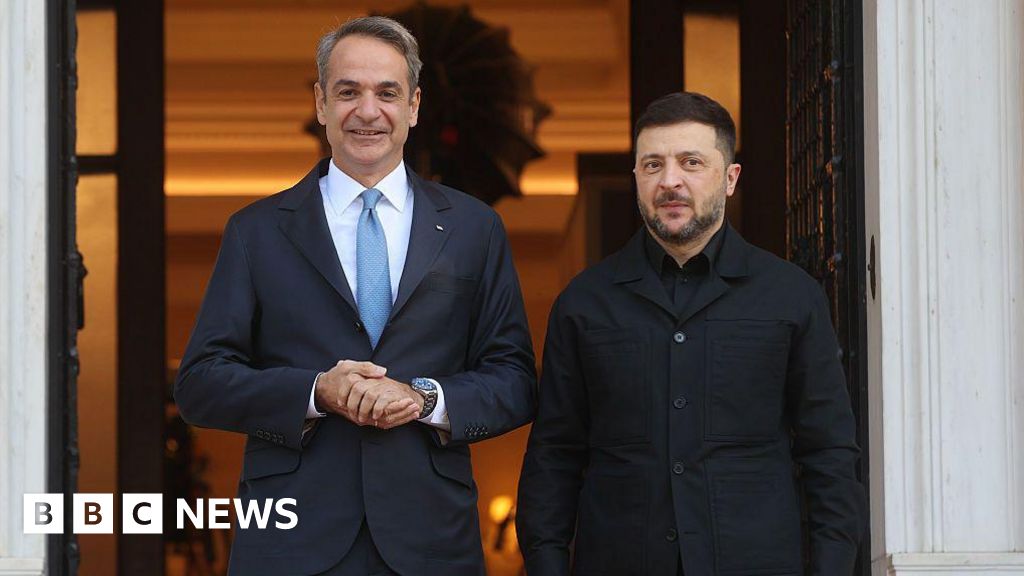Top Stories
Ukraine Secures US LNG Imports via Greece Amid Ongoing Conflict

Ukraine is set to import vital supplies of liquefied natural gas (LNG) from the United States through Greece, a significant development announced following a meeting between Ukrainian President Volodymyr Zelensky and Greek Prime Minister Kyriakos Mitsotakis. The agreement will facilitate the flow of LNG via a pipeline across the Balkans, starting in January 2024. This strategic move aims to bolster Ukraine’s energy security as the country continues to face the repercussions of the ongoing conflict with Russia.
Mitsotakis emphasized Greece’s role in enhancing the supply of American LNG to the region, stating that it is essential to “replace Russian gas.” This initiative aligns with the European Commission’s plans to eliminate all imports of Russian gas to EU member states by the end of 2027. The Commission argues that revenue from these sales contributes to funding Russia’s military operations in Ukraine.
During his visit to Athens, Zelensky highlighted the critical need for gas imports, particularly in light of the destruction of Ukraine’s own gas production capabilities due to the conflict. He noted that Ukraine has allocated approximately €2 billion (about $2.3 billion) to finance these imports through European partners and banks, under guarantees from the European Commission. This funding will support gas purchases until March 2024.
Fighting continued across several regions of Ukraine, with reports indicating that six individuals were killed in Russian attacks in Kharkiv, Kherson, and Donetsk. Russia’s military has claimed control over three additional Ukrainian villages in these regions, although these assertions remain unverified.
Strengthening Energy Security
In his remarks, Zelensky expressed gratitude for Greece’s assistance, stating, “We rebuild each time the Russians destroy, but this truly requires time, much effort, equipment, and, regarding gas, imports to compensate for the destruction by the Russians of our own production.” Mitsotakis reiterated that Greece is becoming a key energy security provider for Ukraine, reflecting the deepening ties between the two nations in the face of adversity.
The historical context is important, as Ukraine has not directly purchased Russian gas since 2015. Instead, it has relied on supplies from various EU countries, utilizing the Soviet-era Trans-Balkan pipeline that connects Ukraine to LNG terminals in Greece via Moldova, Romania, and Bulgaria.
Ongoing Diplomatic Efforts
Following his discussions in Athens, Zelensky traveled to France for talks with President Emmanuel Macron. The focus of these discussions includes a significant deal concerning air defense hardware, as well as an inspection of military assets including the Rafale fighter jets and the SAMP-T air defense system. The Ukrainian president is also set to visit the headquarters of a proposed multinational force that may oversee a future ceasefire between Ukraine and Russia.
The conflict, which escalated dramatically with Russia’s full-scale invasion in February 2022, has resulted in tens of thousands of casualties, predominantly among soldiers, and has displaced millions of civilians. As Ukraine navigates these challenging circumstances, the importation of US LNG via Greece represents a critical step toward ensuring a stable energy supply amidst ongoing warfare.
-

 Top Stories2 months ago
Top Stories2 months agoTributes Surge for 9-Year-Old Leon Briody After Cancer Battle
-

 Entertainment4 months ago
Entertainment4 months agoAimee Osbourne Joins Family for Emotional Tribute to Ozzy
-

 Politics4 months ago
Politics4 months agoDanny Healy-Rae Considers Complaint After Altercation with Garda
-

 Top Stories3 months ago
Top Stories3 months agoIreland Enjoys Summer Heat as Hurricane Erin Approaches Atlantic
-

 World4 months ago
World4 months agoHawaii Commemorates 80 Years Since Hiroshima Bombing with Ceremony
-

 Top Stories2 months ago
Top Stories2 months agoNewcastle West Woman Patricia Foley Found Safe After Urgent Search
-

 Top Stories4 months ago
Top Stories4 months agoFianna Fáil TDs Urgently Consider Maire Geoghegan-Quinn for Presidency
-

 World4 months ago
World4 months agoCouple Convicted of Murdering Two-Year-Old Grandson in Wales
-

 World4 months ago
World4 months agoGaza Aid Distribution Tragedy: 20 Killed Amid Ongoing Violence
-

 World4 months ago
World4 months agoAristocrat Constance Marten and Partner Convicted of Infant Murder
-

 Top Stories4 months ago
Top Stories4 months agoClimbing Errigal: A Must-Do Summer Adventure in Donegal
-

 Top Stories4 months ago
Top Stories4 months agoHike Donegal’s Errigal Mountain NOW for Unforgettable Summer Views









